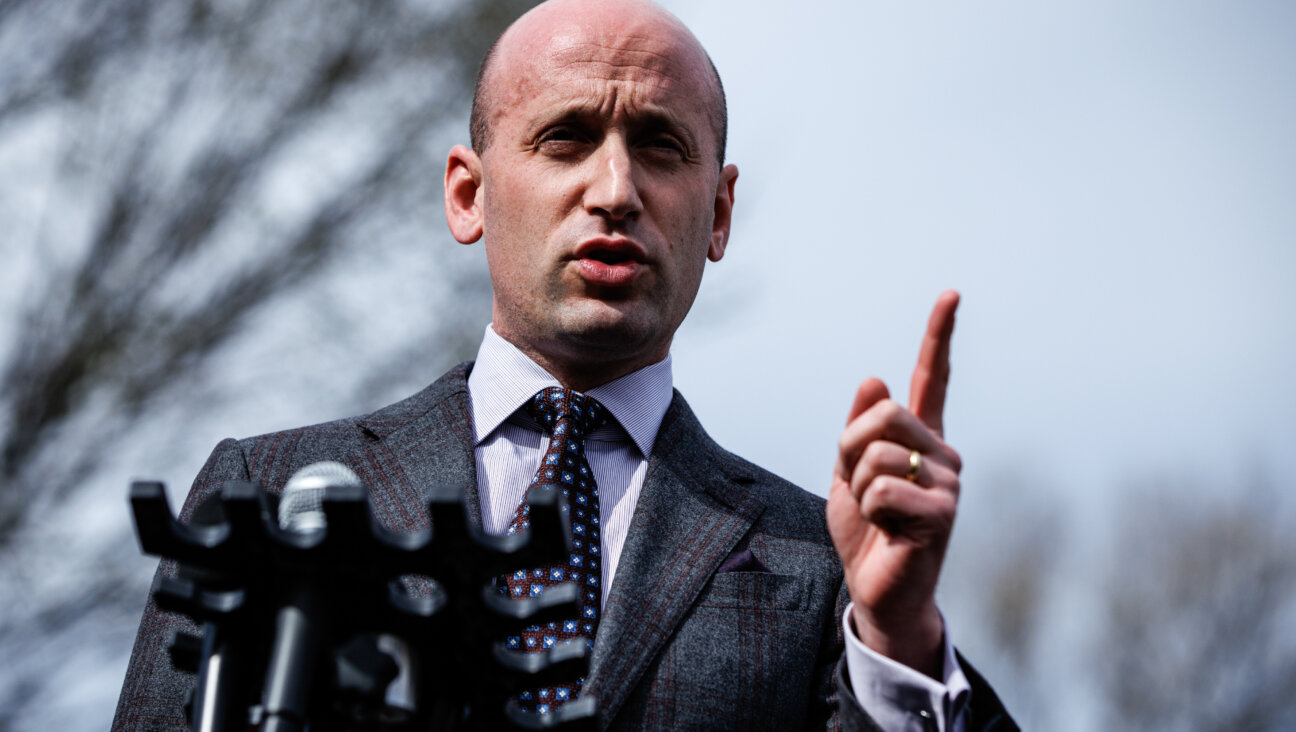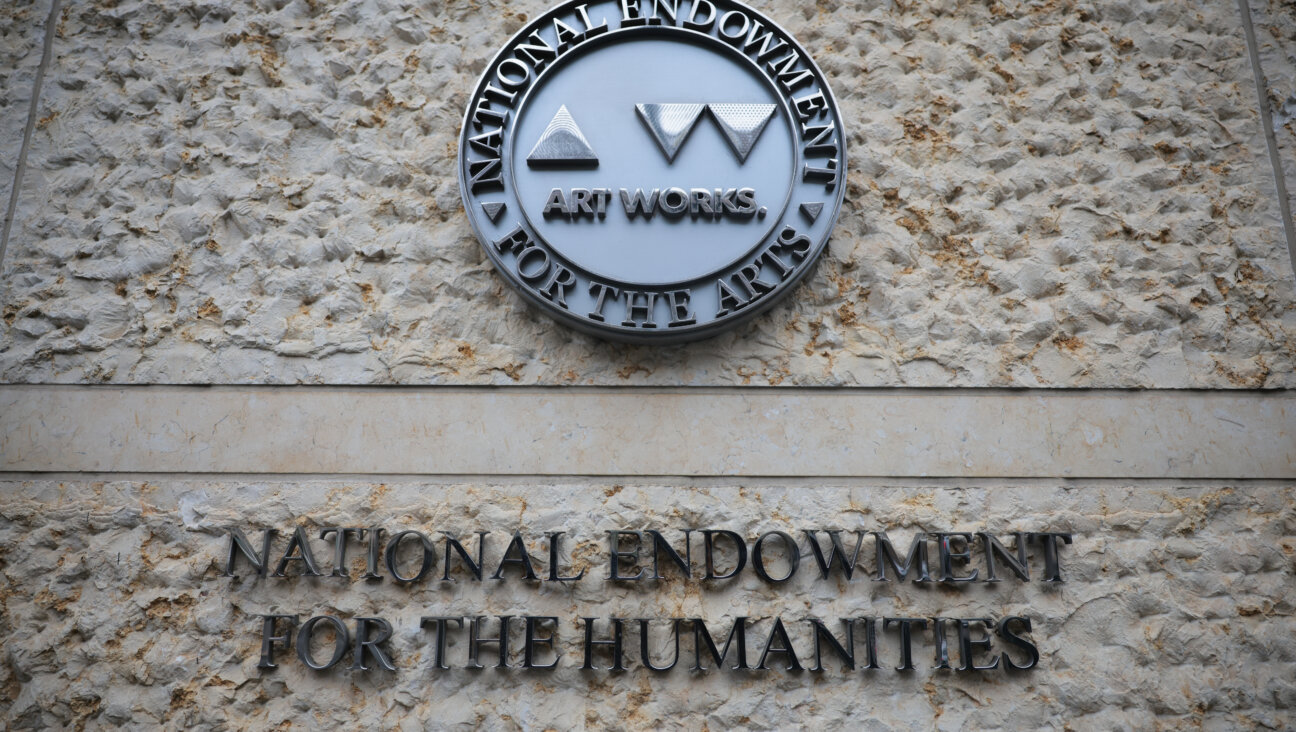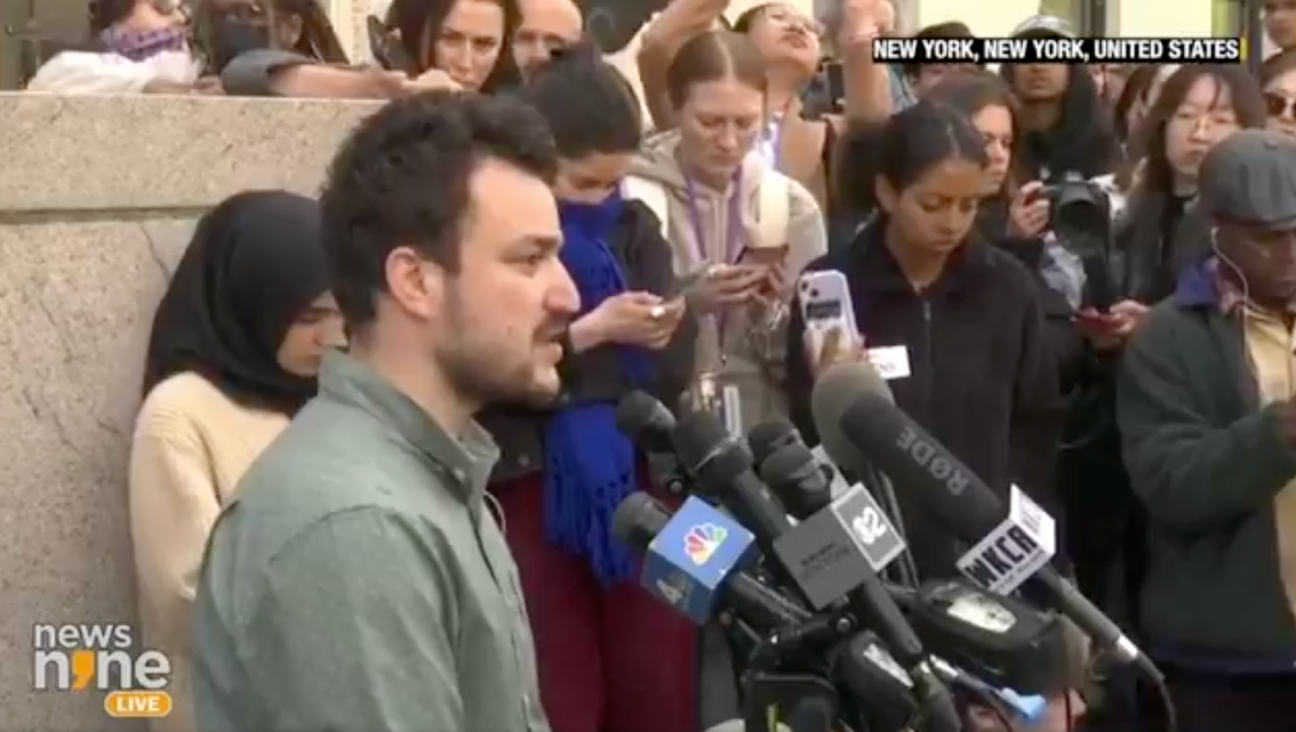Where Is the Love for Israel?
In the September 25 issue of the Forward, we published an essay from columnist Jay Michaelson titled, “How I’m Losing My Love for Israel.” In it, he wrote that defending Israel’s actions in his liberal social circles had grown “exhausting.” Michaelson explained that he has begun to “second-guess” his love for Israel, a love that has made him feel “implicated” in Israel’s actions. All the while, he lamented, the liberal Israel he loves “is increasingly disappearing.”
“I still support the State of Israel, its right to exist and the rest. Most important, it is still, in part, my home,” he wrote. But, he added, “while my love endures, my unease grows, and with it, the gnawing sense that this relationship is in trouble.”
Michaelson’s article sparked a firestorm of debate and discussion, online and elsewhere. In addition to an outpouring of letters and comments — some angry, others appreciative — there were in-depth responses from some prominent thinkers.
Writing in the Forward, historian Jonathan Sarna argued that the “waning American Jewish love affair” with Israel reflected dashed hopes for a utopian Jewish state. “When the bloom falls off of young love, there are always those who announce that their relationship is in trouble and prepare for divorce,” he wrote. “So it is today with too many American Jews and their ‘waning love’ for Israel. The deepest and most meaningful of relationships, however, survive disappointments.”
Rabbi Daniel Gordis weighed in with an open letter to Michaelson (which was republished on the Forward’s Web site) titled “No Right to Exhaustion.” “I don’t see the connection between exhaustion and losing love, or between exhaustion and committing oneself to what’s right and just,” Gordis wrote.
In light of the strong reactions to Michaelson’s essay, the Forward decided to continue the conversation. To that end, we invited four writers of varied political orientations and backgrounds to weigh in on the debate thus far. And we offered Michaelson an opportunity to reflect on the passions provoked by his essay.
Unsettling Zionism
By Gadi Taub
Jay Michaelson’s article “How I’m Losing My Love for Israel” is a sad testimony, not only to his personal grief, but also to the fact that it has become hard to support Zionism in polite liberal society. Zionism is now habitually seen as a Jewish version of apartheid South Africa’s white supremacist ideology.
Unfortunately, we can’t fully prevent all this as long as settlement in the occupied territories continues. But we can limit the damage by resisting the Israeli right’s attempt to portray settlement as the continuation of Zionism. Rather than grant settlement the legitimacy of Zionism, the Israeli right’s rhetoric stained the reputation of Zionism with the illegitimacy of settlement.
In truth, settlement in the West Bank is Zionism’s opposite. Zionism is about liberating people; settlement in the West Bank is about redeeming land. Zionism is about having one place under heaven where the Jews are not a minority; settlement is entangling Israel in a bi-national situation that will lead to an Arab-Muslim majority. Zionism was clear about granting Israel’s Arab population full civil rights, as most democracies treat national minorities; in the territories Arabs do not have these rights, and Jews do. In short, the effort to defend the de facto apartheid in the territories by calling it Zionism ended with liberal public opinion calling Zionism apartheid.
Most Israelis realize that the occupation may doom the Jewish state, and we opted to leave Gaza even in the absence of peace. For the time being, Qassam rockets are preventing us from doing the same in the West Bank. Israelis have been negligent, however, when it comes to conveying that we want to end the occupation precisely because we are Zionists.
So long as we can’t make the case for Zionism as opposed to settlement, we will only have Michaelson’s dwindling nostalgia to defend Israel with, whereas we should have had liberal humanism on Zionism’s side.
Gadi Taub teaches communications at the Hebrew University of Jerusalem. His book “The Settlers and the Struggle Over the Meaning of Zionism” is due out from Yale University Press in 2010.
Diaspora Eyes
By Miriam Shaviv
The end of the Diaspora’s love affair with Israel has been blamed on a variety of internal Jewish factors, including the increasing assimilation of Diaspora Jewry, its disillusionment with the reality of Israeli life, and a turning inward now that Israel is perceived to be strong and self-sufficient. External factors, however, may be far more important.
In the past 20 years, the political climate in the West has changed radically, in ways that do not flatter Israel. Much of Europe is dominated by a post-colonial, almost pacifist, attitude, in which occupation, under any circumstances, is considered immoral, military action is almost always undesirable and the very idea of a modern nation-state is questioned. The range of “acceptable” political opinion in the United States is far broader, but these sorts of views are also gaining traction among many American liberals.
The reality is that throughout history, Diaspora Jews have, to some extent, always absorbed (and at times also led) the political reality in their countries. Zionism itself grew out of the nationalist movements in 19th-century Europe, combined with a Tolstoyan ennobling of land and physical labor. More than a century later, Jews still do not live in a vacuum.
Is it really realistic to expect that Diaspora Jewry remain completely detached from the political zeitgeist, seeing Israel solely through Jewish eyes? Can Jews who grew up in London or Washington really be expected to understand Israel the way it understands itself, when their basic political, cultural and even religious frames of reference differ so radically?
The drift between the two communities is to an extent inevitable, at least as long as current Western attitudes toward warfare prevail — or as long as Israel remains embroiled in conflict. So can a complete breakdown of the relationship be prevented? So far, Israel’s approach has been to try to better explain the realities it faces to the Diaspora, mainly by bringing young Diaspora Jews to spend time in the Jewish state. But perhaps Israelis need to take a step back, and first try to improve their own understanding of the realities that prevail in the Diaspora.
Miriam Shaviv is foreign editor of Britain’s Jewish Chronicle.
Left-Wing Mythology
By Jonathan S. Tobin
Jay Michaelson is right when he suggests that American Jews mythologize Israel in a way that says more about their own sense of identity and politics than it does about the Jewish state. Leftists play this game just as much as the Likudniks Michaelson presumably loathes. Coming to grips with the real Israel requires us to have the maturity to understand that it is a great democratic nation run by fallible people who can make mistakes. This flawed country nonetheless has the right to defend itself against the Palestinians who, as it happens, have a violent political culture based on negation of the Zionist project.
That’s the problem with leftist laments such as Michaelson’s. His lost love is based, as he admits, on his frustration with the absence of peace and the unpopularity of Israel among American liberals, who increasingly tend to wrongly view it as an apartheid state. For all of Israel’s imperfections, the lack of peace is due to its having antagonists whose own identity rests on a belief that the Jewish presence in the land is illegitimate. That is what has prevented the Palestinians from accepting land-for-peace solutions in the recent past and is what continues to make the notion that either the Palestinian Authority or the Islamists of Hamas will ever accept a final peace deal with Israel a fantasy no matter where the borders might be drawn.
Those on the American left either can’t or won’t accept this, and that makes their own illusions about what should be done to achieve peace a more damaging myth than anything dreamed up by naïve Zionist sympathizers. If life among the liberal elites forces Jewish liberals to find the courage to stand up against these false narratives about Israeli beastliness, then they are just going to have to find the courage to risk the opprobrium of their peers. But if they are so disconnected from the realities of the Middle East or too tired or susceptible to peer pressure to do so, they should not expect much sympathy from the rest of us.
Jonathan S. Tobin is executive editor of Commentary magazine.
Wild Things
By Steven J. Zipperstein
When we were young, many of us were told tall tales about Israel. Parents tend to protect the young from those wild things, unruly, ambiguous things that make the world odd — and also interesting — but that often are hidden to protect the sleep and innocence of children.
Israel tended to be spoken about among Jews, especially following the 1967 war, in heroic terms, in major key; it remains there for most Orthodox Jews. For many of the rest of us there are the annoyances and embarrassments and angst that have led Jay Michaelson to muse about turning his radio dial, removing himself from this tumult to more benign music. He writes in his essay about how much easier it is for him as a Jew to traverse the streets, the culture of Berlin than of Jerusalem.
And so it should be. Berlin has, more or less, come to terms with its past. Israel continues to debate with all around it — and with not a few within it — past, present and future. The byproduct of this can be, and sometimes is, awful: arguments leading nowhere and that have gone on forever; enemies who keep worsening; Israeli leaders who keep coarsening; a conflict that crossed the line of quagmire ages ago. Little surprise Michaelson prefers to avoid this; so would I.
But to do so means dereliction. No issues in contemporary Jewish life loom so large, and feel so burdensome, as do those facing Israel: These include reconciling democracy and Jewishness, cobbling together a coherent political culture embracing a large minority of Arabs not grudgingly but emphatically, and moving beyond arguments of left and right in a debate that for so long has had little to do with either. It also means a readiness to move toward a two-state solution — once the other side is ready, too.
Wild things fill our woods. Many are inside of us; some threaten, with horrors, from without. They will certainly persist. Adults have — and more often than we’d sometimes care to admit — knotted feelings about what it is we care about most, but the alternative is the simplicity of childhood tales that go down easily because they flatten so much.
Steven J. Zipperstein is the Daniel E. Koshland Professor in Jewish Culture and History at Stanford University. He is the author, most recently, of “Rosenfeld’s Lives: Fame, Oblivion, and the Furies of Writing” (Yale University Press).
The Forward is free to read, but it isn’t free to produce

I hope you appreciated this article. Before you go, I’d like to ask you to please support the Forward.
Now more than ever, American Jews need independent news they can trust, with reporting driven by truth, not ideology. We serve you, not any ideological agenda.
At a time when other newsrooms are closing or cutting back, the Forward has removed its paywall and invested additional resources to report on the ground from Israel and around the U.S. on the impact of the war, rising antisemitism and polarized discourse.
This is a great time to support independent Jewish journalism you rely on. Make a Passover gift today!
— Rachel Fishman Feddersen, Publisher and CEO
Most Popular
- 1

Opinion My Jewish moms group ousted me because I work for J Street. Is this what communal life has come to?
- 2

Opinion Stephen Miller’s cavalier cruelty misses the whole point of Passover
- 3

Opinion I co-wrote Biden’s antisemitism strategy. Trump is making the threat worse
- 4

Opinion Passover teaches us why Jews should stand with Mahmoud Khalil
In Case You Missed It
-

Culture Jews thought Trump wanted to fight antisemitism. Why did he cut all of their grants?
-

Opinion Trump’s followers see a savior, but Jewish historians know a false messiah when they see one
-

Fast Forward Trump administration can deport Mahmoud Khalil for undermining U.S. foreign policy on antisemitism, judge rules
-

Opinion This Passover, let’s retire the word ‘Zionist’ once and for all
-
Shop the Forward Store
100% of profits support our journalism
Republish This Story
Please read before republishing
We’re happy to make this story available to republish for free, unless it originated with JTA, Haaretz or another publication (as indicated on the article) and as long as you follow our guidelines.
You must comply with the following:
- Credit the Forward
- Retain our pixel
- Preserve our canonical link in Google search
- Add a noindex tag in Google search
See our full guidelines for more information, and this guide for detail about canonical URLs.
To republish, copy the HTML by clicking on the yellow button to the right; it includes our tracking pixel, all paragraph styles and hyperlinks, the author byline and credit to the Forward. It does not include images; to avoid copyright violations, you must add them manually, following our guidelines. Please email us at [email protected], subject line “republish,” with any questions or to let us know what stories you’re picking up.













